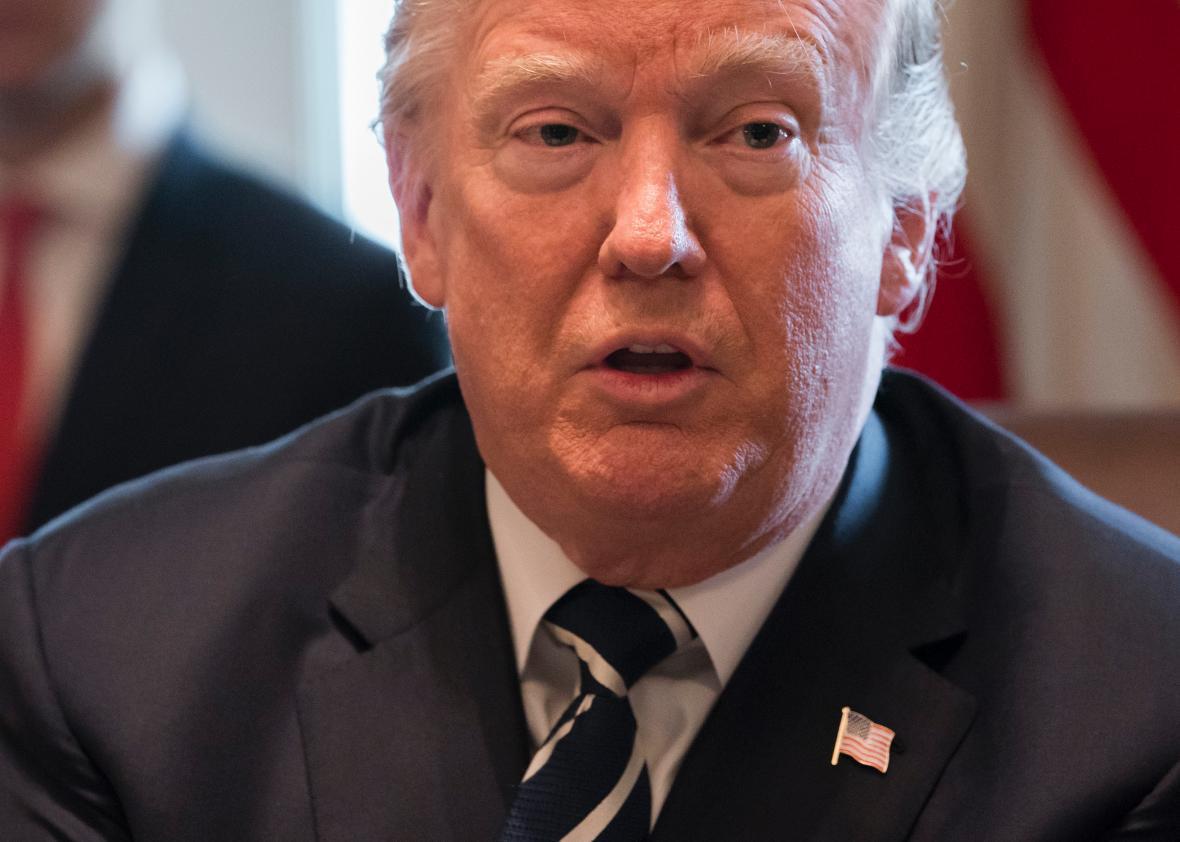Senators on both sides of the aisle have been working on a narrow bill to stabilize individual insurance markets for well over a month now. One of the major stumbling blocks was President Trump, who seemed fully disinterested, if not outright hostile, to the idea. That appeared to change on Monday when Trump manufactured a storyline that would allow him to take credit for a short-term bill to clean up the mess he’s made. In Trump’s fantasy, no one was even talking about passing such a measure until his determined action last week.
“As we meet,” Trump said during a Cabinet meeting on Monday morning, “Republicans are meeting with Democrats because of what I did with the CSR [payments], because I cut off the gravy train. If I didn’t cut the CSRs, they wouldn’t be meeting. They’d be having lunch and enjoying themselves, alright?”
Trump was referring to his decision last week to discontinue cost-sharing reduction payments to insurers, which keep deductibles in check for lower-income Obamacare enrollees. In his words, the abrupt move “has actually brought Republicans and Democrats together … saying, let’s come up with at least a short-term fix of health care in this country.” Later, during a press conference with Senate Majority Leader Mitch McConnell, Trump reiterated how pleased he was to see Republicans and Democrats working together on an “intermediate plan, a short-term plan.”
This alternative history—the one that says all Trump ever wanted was for Democrats and Republicans to provide short-term relief—will come as some surprise to Republican Sen. Lamar Alexander of Tennessee and Democratic Sen. Patty Murray of Washington, respectively the chairman and ranking member of the Senate HELP Committee. Alexander and Murray have been negotiating such a “short-term fix of health care in the country” for the past month and a half—in the face of White House indifference at best, and opposition at worst.
“It’s like starting a fire and taking credit for the firefighters’ work,” a Democratic Senate aide told me.
When the Senate Republicans’ first push to repeal and replace Obamacare collapsed in late July, Alexander announced that he would hold hearings on how to stabilize individual insurance markets. After several of these hearings, he and Murray began negotiating a deal that would, broadly, appropriate the CSR payments for two or so years while offering states flexibility on some of Obamacare’s regulations. They were hoping to get something done by the end of September, the deadline for insurers to finalize 2018 rates.
When Senate Republicans chose to make a second push for repeal-and-replace—the Graham-Cassidy bill—Alexander suddenly announced that the negotiations had not “found the necessary consensus among Republicans and Democrats” to produce a viable bill. But what really happened is that Republican leaders called off the stabilization talks as a pressure tactic to get hesitant Republican senators on board with Graham-Cassidy. The White House played its part, telling Senate Republicans that they would oppose a bipartisan stabilization bill; Vice President Mike Pence said in a caucus lunch that Trump wouldn’t support anything to “prop up” Obamacare.
Graham-Cassidy failed anyway in late September. After that, the bipartisan talks that had supposedly hit a wall resumed. Still, there was no indication that the White House would support them. On Friday, Office of Management and Budget Director Mick Mulvaney told Politico that the White House would have no interest in a “clean Murray-Alexander bill,” but suggested they might be open to it if it were linked to one of the president’s unrelated vanity projects, like The Wall.
Now, just a few days later, Trump thinks that a short-term solution would be sensational so long as he gets to take credit.
Senate Minority Leader Chuck Schumer issued a statement after Trump’s comments welcoming the president’s apparent reversal (assuming he sticks to this new position for longer than a few hours). “If he’s now supportive of an agreement that stabilizes and improves the existing system under the Affordable Care Act,” Schumer said, “we certainly welcome that change of heart.”
You know what would have been really great, though? If Trump had supported these efforts that predated his involvement before 2018 rates were finalized. Even if a short-term bill can retrofit some way to lower costs for 2018 enrollees—though unspecific, Alexander said Monday the bill would require that the “benefits” of the CSR payments for 2018 “go to the consumers and not to the insurance companies,” some way or another—much of the damage has already been done, as Trump’s dithering on CSRs already led insurers to set higher premiums.
This all could have been worked out in a timely fashion but instead lingered until Trump tossed himself into the issue like a grenade last week. He is by default opposed to any legislative effort that he can’t pretend to have inspired, and now he’s using a needless shock to the system to concoct a history that satisfies his ego. If the short-term bill passes, he should take the credit and the blame altogether. If he gets credit for the short-term bill passing, he should also get the blame for such an emergency measure ever being necessary in the first place.
